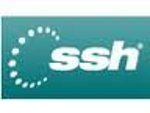SSH (Secure Shell)
SSH (Secure Shell) is a protocol for creating a secure connection between two computers.
The secure SSH connection provides authentication and encryption. SSH also provides compression.
The SSH protocol is defined by the IETF Secure Shell Working Group(secsh).
SSH was designed as a replacement for the legacy `telnet` application.
The computer being connected to must be running an ssh daemon, or server, process.
The computer which is attempting to connect must be running an SSH client.
SCP and SFTP – Secure File Transfer Using SSH
SCP and SFTP are replacements for the legacy `cp` and `ftp` file transfer applications.
SCP and SFTP enable secure encrypted file transfer over an SSH connection.
Free SSH Servers
There are several free SSH implementations available. Some support only SSH, while others also support SCP and SFTP.
| SSH Server | Operating Systems Supported |
|---|---|
| OpenSSH | AIX, HP-UX, Irix, Linux, NeXT, SCO, SNI/Reliant Unix, Solaris, Digital Unix/Tru64/OSF, Mac OS X, and Cygwin |
| Dropbear SSH Server | Linux, Mac OS X, FreeBSD, NetBSD, OpenBSD, Solaris, Irix, True64, AIX, HP-UX |
| FreeSSH | NetBSD, FreeBSD, Linux |
| lsh | GNU/Linux on Sparc, Intel, PPC and Alpha, FreeBSD, Solaris and IRIX |
| SSHD-NT | Windows |
| OpenSSH for Windows | Windows |
Free SSH Clients
| SSH Client | Operating Systems Supported |
|---|---|
| OpenSSH | AIX, HP-UX, Irix, Linux, NeXT, SCO, SNI/Reliant Unix, Solaris, Digital Unix/Tru64/OSF, Mac OS X, and Cygwin |
| FreSSH | NetBSD, FreeBSD, Linux |
| lsh | GNU/Linux on Sparc, Intel, PPC and Alpha, FreeBSD, Solaris and IRIX |
| OpenSSH for Windows | Windows |
| PuTTY | Win32 and Unix |
| MSSH | Windows |
| WinSCP | Windows (SCP and SFTP, no SSH) |
| Fugu | Macintosh |
| MacSSH | Macintosh |
| Cyberduck | Macintosh (SFTP only) |
| pssh | Palm OS |
| TuSSH | Palm OS |
Note: I have specifically excluded SSH clients and servers which do not support the SSH v2 protocol.
For more information on SSH, read the SSH FAQ.



Comments - No Responses to “SSH (Secure Shell)”
Sorry but comments are closed at this time.